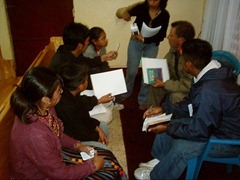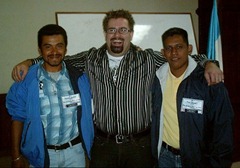 How often do you speak or teach? Or how often do you communicate ideas to someone else in the hopes that they’ll change their thinking or behavior?
How often do you speak or teach? Or how often do you communicate ideas to someone else in the hopes that they’ll change their thinking or behavior?
I’ve been writing and delivering talks for about 6 years now in a pretty full-time capacity (on at least a weekly basis). That means I’ve probably prepared over 600 little nuggets of wisdom that some poor souls were fortunate (?) enough to endure.
Because believe me, most of them have been pretty rough. And while I’ve wrestled with the content of my talks/lessons/studies/sermons/discussions/etc. as long as I’ve been speaking, it’s only been in the past couple of years that I’ve really put much effort into the style of my talks, the way I deliver them. And I have to say that as I’ve put more work into the style, the degree to which my audience absorbs and adopts my content has improved dramatically.
I’ve learned that just saying something true isn’t enough to change someone’s life. We have to learn how to say it well.
So over the next few weeks, I wanted to reflect on some of the lessons I’ve learned in the past few years about speaking. And whether you’re a speaker or not, I hope you find some stuff that will help you communicate better. And share your tips with me!
Today, just this:
Who you’re addressing should affect what you say.
 When I prepare a talk, I look at it as a journey. I am usually trying to convince you (my audience) of the truthfulness of an idea, or the worthiness of a practice to be implemented in your life. So as I prepare, I think about what your thoughts and opinions are. In most of my speaking engagements so far, I have been able to assume (rightly, as it turns out) that most of my audience are on the same basic journey that I had to go on, so I have been able to craft my talks so that they follow my own journey of discovering this particular truth or practice.
When I prepare a talk, I look at it as a journey. I am usually trying to convince you (my audience) of the truthfulness of an idea, or the worthiness of a practice to be implemented in your life. So as I prepare, I think about what your thoughts and opinions are. In most of my speaking engagements so far, I have been able to assume (rightly, as it turns out) that most of my audience are on the same basic journey that I had to go on, so I have been able to craft my talks so that they follow my own journey of discovering this particular truth or practice.
But one time…
 I was invited to speak at a pastors’ conference in Guatemala, and when they found out that I was a youth minster, they scheduled a youth rally. They asked me to speak three times on youth ministry – once to the Guatemalan youth workers, once at the youth rally and once to the senior pastors about Youth Ministry.
I was invited to speak at a pastors’ conference in Guatemala, and when they found out that I was a youth minster, they scheduled a youth rally. They asked me to speak three times on youth ministry – once to the Guatemalan youth workers, once at the youth rally and once to the senior pastors about Youth Ministry.
I was excited, but also at a loss. I had no idea what Guatemalan culture, Church culture or Youth culture were like. What struggles they faced or what questions they were asking.
We landed in Guatemala City and spent a day traveling to Quetzaltenango on the other side of the country. Our driver, Carlos, was the head of the Guatemalan Baptist Youth Conference, so I was able to question him a bit. But I really wasn’t able to write my talks until the following night, after I was able to share a room with the Guatemalan youth workers. We spent a couple of hours just talking about how they do ministry and what their challenges are. I learned that almost every ministry there faced two common problems:
-
The persons they invited to their church communities didn’t come back.
-
Their senior pastors would not let them implement creative, nontraditional strategies for sharing the Gospel.
I spent the first night, then, teaching on a model of community that encouraged return visits. And the next day, I spoke with the pastors about creative, nontraditional incarnations of the Gospel in Guatemala (and that talk was followed by 45 minutes of questions and answers).
Because I learned their journeys, I was able to communicate effectively a message they needed and wanted to hear.
As I consider who my audience is and where they are on the conceptual journey I want to travel with them, I am able to craft my talk in such a way as to invite them on that journey with me. My steps become their steps.
And because I invite them to engage my material this way, they are more likely to own my conclusions as their own. They don’t just take my word for it; they have walked this road themselves.
So when you speak, who is your audience? And what are you doing to lead them to your conclusions (as opposed to standing at the end of the road and yelling at them to catch up)?
